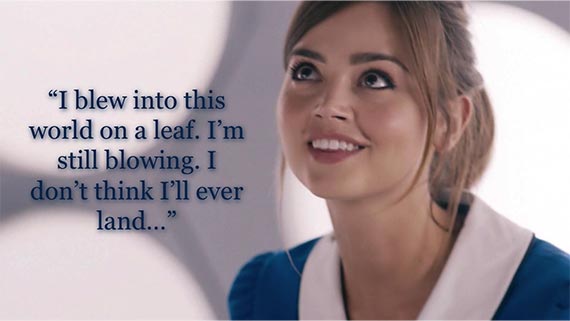Clara Oswald: A Study of the Impossible Storyteller (Part 3)
Guest contributor Ruth Long concludes her tribute series looking back over Jenna Coleman’s companion.
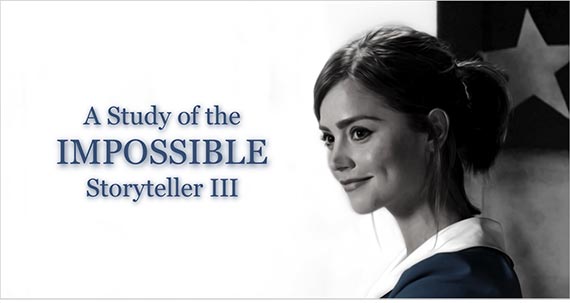
- Catch up on A Study of the Impossible Girl
- Catch up on A Study of the Impossible Mirror
- Catch up on A Study of the Storyteller: Part 1
- Catch up on A Study of the Storyteller: Part 2
As we look back on her final act, I wanted to pay tribute to the companion that has defined and driven my experience as a fan of the show. ‘A Study of the Impossible’ is a series of articles examining the character of Clara Oswald. In each chapter, we will be exploring the Impossible Girl in her journey with the Doctor: from the moment she set foot in the TARDIS, to the day she bade us farewell. This fifth installment (Chapter 3 Part 3) will predominantly focus on the finale of Series 9, though naturally, there will be references made to her entire tenure.
Clara Oswald is defined by the stories she tells. But however hard she might try; you can’t always control your story. Within her own universe, as with ours, there are limitations: rules that cannot be broken, boundaries that cannot be crossed, the grounding of human frailty and the burden of history. When you stand alongside an ageless bird that counts the seconds of eternity, can one really hope to follow it into the distant reaches of the sky? And yet, Doctor Who is a show that enchants us with tales of impossible heroes and the escape of far-flung dreams. A melody of singing towers, a spaceship crashing in a little girl’s garden, a wise old alien and his granddaughter in a shabby police-box, a hand grabbed and a life changed forever. It holds the endless promise that stories can make us fly.
So perhaps, in this world, it is possible to grow wings…
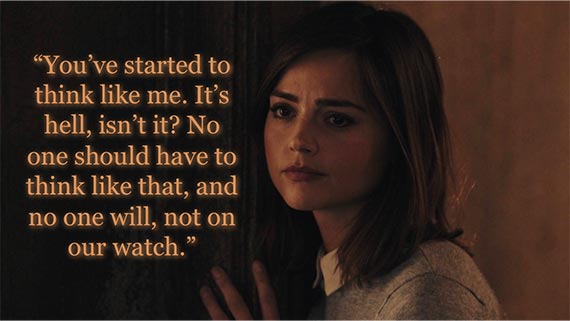
I once said that Clara is captivated by the idea of ‘being better, and more, than she really is’: fueled by a yearning aspiration for something greater than herself. An endless quest in pursuit of a grander story, forging her person to fit this ideal. First with masks, then as those collapsed, through love and loss discovering in what remained that “Just Clara” was all she ever really needed. A dreamer of the Doctor’s kind: an inherent resemblance among two kindred spirits. Each possessed with the madness of a perpetually sought horizon, blazing with the radiance of a million stars – never stopping, never ceasing. For she wasn’t made by the Doctor, but in her time with him became the best of who she already was; the most ‘Clara’ she could ever be.
But even the bravest and cleverest of humans are breakable. There exists a barrier that can’t be overcome regardless of one’s nature or desire. Clara Oswald is mortal, fragile, fleeting; where he will be reborn she will fall where she stands, such is the way things are. Even so, ‘Face the Raven’ is at its core a regeneration story. Clara has never been more Doctor-y, more herself; ‘equal parts stubbornness, adrenalin and chutzpah’ as the script describes. The episode comes on the heels of their most recent escapade: the two laughing without a care, slipping past disaster as usual (“Admit it, I totally saved your life!”). Though as is the custom, everything changes with a phone call.
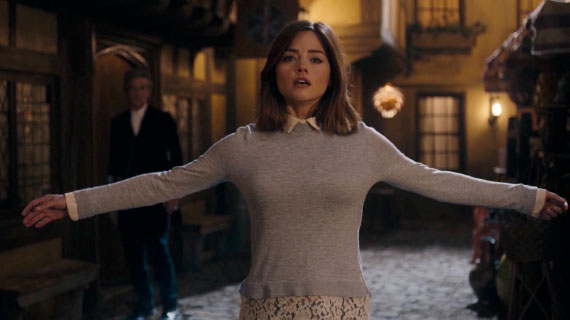
For Rigsy, ‘Doctor Oswald’ was the mystifying individual who took him by the hand and led him into a crazy, incomprehensible world. Through their encounter she helped him to recognize the promise within himself – the effect of a cosmic explorer’s infectious brilliance. It could only be fitting, then, for Clara to give her life saving her ‘companion’. She takes on his sentence like the Ninth Doctor for Rose, the Tenth for Wilf, or the Eleventh for the people of Christmas; motivated by the possibility that another little girl could grow up without a parent. Compassion: Clara wouldn’t die of anything else. I’ve no doubt she’d simply reject any other ending than one as a hero.
Yet her intention wasn’t noble self-sacrifice (spent in vain). She made a fatal error of judgment; one she couldn’t recover from with Galifreyan trickery. “We can fix this, we always fix it” Her delusion of invincibility garnered from so many wins, an expectation that the determination to succeed can stave off catastrophe; that the luck won’t run out. In her heart Clara knows that which she acknowledged but never truly accepted: you can’t run forever. The path she’s chosen; has always chosen, is bound to expire. Addiction, the insatiable need to go further, to take more risks, to burn brighter and brighter until she erupts into flames. Her destined tragedy: blowing away in a stream of smoke.
To kill a storyteller is to tear out the pages; by comparison death is but a triviality. Clara’s final act is to write her afterword, claiming it all as her own (“I did this. You hear me? I did this”). She’ll die for who she is and who she loves, make every breath count, leave behind a healer instead of a warrior. “You will not insult my memory,” one last order, a hug, a smile; everything still unsaid. He needs to remember her like this – shoulders squared, eyes shining, proud and brave. She’s terrified. This is her choice; time to face the Raven. Arms held wide, embracing her fate as a Doctor would: not with luminous energy but a silent, soul-piercing cry.
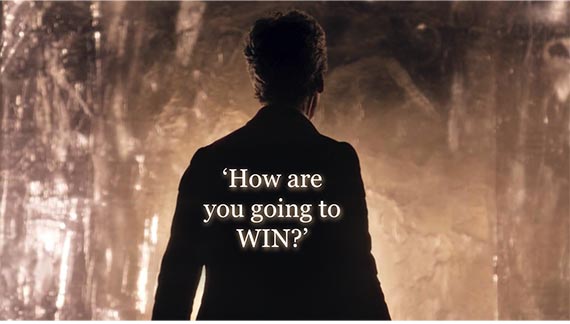
Consider the Doctor. The Doctor trapped. The Doctor alone. On the run – no TARDIS, no friends, no help. Isolated with only his own nightmares for company… or perhaps not quite. ‘No longer there’ isn’t the same as gone. In ‘Heaven Sent’ Clara whispers with no voice, writes with no hands, stands with no body and smiles with no face. She prevails as all stories do: abiding in the minds and hearts of those who hear it. To put it simply, Peter Capaldi’s ‘one hander’ is the epitome of Clara’s absence augmenting her presence. Here, she is a portrait painted solely through the Doctor’s eyes, and there’s plenty to divine from such a depiction.
The grief and painful image of her death is both torment and impetus for the Doctor throughout his imprisonment. Inside the sphere of his imagination, ‘Clara’ serves as an audience and haunting guide; infused by his recollections, embodying the impact she has made on him. In that regard, it’s fascinating to see how she is represented. “Always the teacher,” her apparition asks questions, corrects, encourages and instructs: the manifestation of his unyielding perseverance (“Get over it. Beat it. Break free”), therein casting shades of the original (“Start winning Doctor, it’s what you’re good at”). A woman who can manipulate and inspire: relentless or comforting as the case demands – Not a quality he lacks, either.

Consider the Doctor. Why does he always survive? Clever? Not enough. Courageous? Not enough. Assuming? Not enough. Something else is required. “Why can’t I be like you?” Clara calls out to the laws of the show’s universe, between her and the Doctor a wall of solid Azbantium – hopeless, unconquerable. Held firmly in her place by narrative bounds…
Until they break.
Chiseled away over four and a half billion years.

‘Hell Bent’ is generally the seat of contention due to how it alters Clara’s departure, arguably undermining the validity of her demise on Trap Street. However, what’s vital to account for is its place within the context of Clara’s entire journey as a character. To that end, what transpires in ‘Face the Raven’ is an essential catalyst in the chronology of her overall arc, and the events that ensue mark its preeminent conclusion to the fullest extent. The three-part finale, which we’ll informally dub the ‘Hybrid trilogy’, is thus an arrangement of interdependent stories that successively build towards this culmination.
Since we first met her as a Dalek absorbed in a fantasy, a Victorian governess insisting she was born behind the clock-face of Big Ben (“Accounting for my acute sense of time”), and a nanny tightly clutching her mother’s ‘101 Places to See’, we’ve watched as Clara spun her life into an evolving work of fiction. From following the romantic vision of a classical heroine who defied an Old God and valiantly dived into a time-stream; to walking in the Doctor’s footprints until her steps matched his own, traversing through greyer hues of moral uncertainty and weathering storms interspersed with molten lava. Outgrowing and shedding each façade along the way; gradually learning to embrace her imperfections and cast aside the impeccable veneer in lieu of the broken, but brilliant, woman underneath.

The place she once called home now lies far behind; irreversibly separated from those around her by a foreign outlook and unfathomable experiences. So much has changed, but Clara has always carried that familiar inclination: the affinity that draws her profile to align with an unearthly wanderer’s. Her gaze turned ever upwards, she climbed to newer heights alongside him; not hesitating for introspection lest she admit the inevitable, punctuated by his futile warnings. They remained unheeded, because why can’t she be reckless? Why can’t she be like him? Why can’t she endure against the insurmountable? Erupt into flames and carry on – as he does?
Although it wasn’t the intention, Clara meeting her downfall through (intuitively) emulating the Doctor fashions the scenario into a cautionary tale. It declares her an Icarus, so to speak, who ventured too close to the sun upon makeshift feathers held by wax; rending her ambition unattainable, as she plummets into the sea (though here not so much a product of hubris, but her endeavor to ‘fly’ in spite of the restraints she was cognizant of). A somber parable that, though becoming of the character, and filled with a poignant beauty, doesn’t fully realize the essence of her story – at least not to its pinnacle. Of course, Clara herself asserts complete ownership of this outcome; yet that’s precisely why it couldn’t have ended there. A reflection has two faces, after all.

The impossible mirror: A passionate and powerful Time Lord, and a young woman so very similar to him; companions who were willing to push each other to extremes. The controlling and the uncontrollable: mutual in vehement devotion and dauntless lunacy. Combined, their shared flaws weren’t tempered but charged – He would deceive, she would lie; he would forsake, she would betray; he would evade, she would avoid; he would greet danger and she would be by his side. Both were prepared to forfeit their own lives, but vowed to break any rule, cross any boundary and rip apart reality itself to guard their counterpart. The formidable force heralded by every Cloister Bell, foreseen in ancient prophecy…
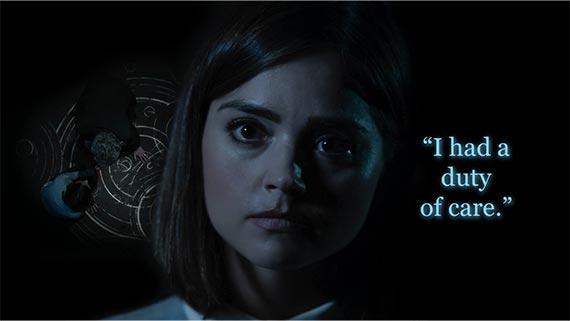
Because Clara, occupied as she was with constructing her closing paragraph, hadn’t considered the Doctor. Anticipated his fury and anguish, yes, but not the lengths he would go to on her behalf (“What’s so important, you would fight for so long?”); destroying his hearts innumerable times over to heal hers, aided by her phantom. “Why? Why would you even do that to yourself?” There’s a boyish puzzlement to the Doctor’s response, opposite her utter astonishment: The answer was obvious, surely? Confounded by the depths of his dedication, her expression mimics that of ‘Dark Water’ in the wake of his unconditional forgiveness. Immersed in her own narrative, so involved with commanding its course, perhaps Clara had overlooked her part in his. For their stories were entwined.
Alas, as we know, his efforts could not be without dire repercussions. Clara was a dead woman walking, an affront to existence: her very being pulled at the thread of a web, which threatened to unravel. But the Doctor flouted it, shunned his codes, abandoned his title; this was a fracture he would not allow to mend. “After all this time, after everything I’ve done, don’t you think the universe owes me this?” A bargain he’d made before, so very long ago – always with a catch. Instigator and co-conspirator; equally guilty of the resulting chaos, the two fled to the end in a whirlwind of desperation. Standing as Galifrey lay in ruin, the plan initiated with a phone number had finally reached its peak. “Just the Doctor and Clara Oswald in the TARDIS,” risking everything.
Depicting their relationship as purely harmful, however, would be disingenuous. “This has to stop, one of us has to go” Ultimately, the episode resolves their bond with a move of total selflessness. Because united, they weren’t just a Hybrid; intended to bring about devastation. The Doctor and Clara, for all of their faults, were the greatest of one another – each holding a secret that murmured in childhood dreams, spanned many lifetimes, and now resides unheard within the halls of the Cloisters. The Master, in her sowing of discord, had failed to contemplate friendship: a friendship older than human civilization, and more complex than she would ever understand.
They both knew it had to end. At first it seems the Doctor would be blinded by his own conviction of personal responsibility (which, as Ohila and Me pointed out, was a double-edged sword that risked hurting the very one it fought to save). He reaches for the pages, about to tear them away into oblivion; an act of violation he had no right to bestow, justified by a falsehood mistaken for kindness. Clara halts him in his tracks:
“These have been the best years of my life, and they are mine. Tomorrow is promised to no one, Doctor, but I insist upon my past. I am entitled to that. It’s mine.”
“Running away with a spaceman in a box, anything could happen to you,” but that’s what she’d always counted on. She had never asked for the Doctor’s protection, and safety can’t be guaranteed, but her memories were an irrevocable gift; valued beyond measure. The scene thus decisively, unequivocally proclaims Clara’s control over her story: once and for all. And so the pair, too alike, choose to let go together. “Good luck”. A flicker, a realization: there was something he must do, one last order before goodbye. As he surrenders to the neuro-block, the Doctor finally tells Clara ‘the rules’, including the most important – giving her all that she needed:
“Run like hell because you’ll always need to. Laugh at everything because it’s always funny. Never be cruel, and never be cowardly. And if you ever are, always make amends. Never eat pears…
… Smile for me.”
And with that, Clara Oswald faded into song.
“I don’t believe in ghosts,” declared the young woman, stopping beside a headstone. Engraved into the rock, unnoticed, was her name. She had died, she was gone; we’d seen it. Yet Clara Oswald is still out there, somewhere, whose enigma baffles the Doctor to this day… perhaps the universe does make bargains, after all. It would appear that we’ve finished where we started. Undoubtedly, this bookending with ‘The Snowmen’ isn’t by accident; ‘Hell Bent’ is richly layered with symbolism and thematic undertones paying homage to the past three series with her character, but there’s an even deeper meaning at its centre.
“There’s no such thing as the Doctor,” just someone in a box, “telling stories”. And this is where we leave Clara. The insecure control-freak who dared to look up, and in doing so, found herself. She parts ways with the Doctor as a mystery, a myth, memories lingering in music to a tune of sadness pervaded by hope. “If he could just keep standing there, so beautiful…” a look back, full of longing, but Clara knows he’ll be alright; she’d given him all that he needed. Her famous mantra is no longer a request to be remembered; instead it summarizes their final message for each other:
‘Run, and be a Doctor.’
Turning away, her sorrow quickly melts into joy: because that’s what they’ll both do. Bouncing around all of time and all of space in a stolen TARDIS with a faulty Chameleon circuit, companions in tow who will in turn teach them. Both hoping that maybe, just maybe, if they try very hard, they can live up to that promise – the words that defined a relationship, the words neither will ever forget. No more shortcuts through a graveyard; Clara decides to take the long way round this time. The wickedest grin on her face, striding around the console, slamming controls, ‘like she was born to it’. Ahead, “all the days that should have been,” infinite potential pressed between ‘The End’.
She takes flight into the stars, soaring on the wings of her legacy…
“I’m not a hero.”
“Well, neither am I. But if we both keep pretending to be, perhaps others will be heroes in our name. Perhaps we will both be stories. And may those stories never end…”
Once again I’d like to thank Caitlin for her inspiration excellent pieces on Clara; you can check out her blog here. Likewise ‘Till the Next Time Doctor’ for their fascinating interpretations on the character. Most of all, I’d like to thank Sam for his support, advice and incredible ideas, and all the wonderful folks here on DWTV, who’ve motivated and encouraged me to no end.
I hope you enjoyed this article! What are your thoughts on Clara in Series 9? And how do you view her story as a whole?


